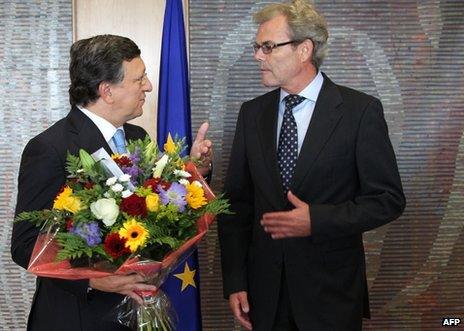EU Nobel peace prize: No minor achievement
- Published
- comments

EU Commission President Jose Manuel Barroso (L) received flowers from Norway's Ambassador to the EU, Atle Leikvoll
Europe's officials could scarcely believe their good fortune today. Unexpectedly, the EU was given the Nobel Peace Prize. The citation, external praised the EU for "over six decades" contributing to the advancement of peace and reconciliation, democracy and human rights in Europe.
Europe's leaders fell upon this rare piece of good news with an almost desperate embrace. If there is a core justification for the European project, it is to make war impossible again on the continent. That has been the EU's outstanding achievement. When under attack, Europe's leaders fall back upon 60 years of peace in Europe. It is no minor achievement.
Secondly, after and just before the fall of the Berlin Wall, external, the EU acted as a beacon for democracy, for human rights and a civil society. Many Eastern European countries rejected communism because they had before them a clear example of an alternative. Young people wanted to be part of a normal European society. Eastern Europe today is testimony to the spread of democracy.
It is also true that the existence of the EU enabled countries like Spain, Portugal and Greece to make the transition from dictatorship to democracy. Even today, in the midst of hardship and austerity, there is a deep attachment to belonging to Europe. That is the legacy of history.
But the Nobel committee's decision will puzzle many. Despite the EU's successes, it failed in the Balkans. It lacked the will and determination to intervene and save lives. The massacre at Srebrenica happened in Europe's backyard.
And the prize comes at a moment of violence and tension on the streets of many European capitals as a young generation endures years of hardship and high unemployment. For them the European dream has not delivered.
It should not be forgotten that the committee in Oslo awarded US President Barack Obama the peace prize, external when he had few achievements to his name. It was a prize offered more in hope.
German Chancellor Angela Merkel said the prize was an inspiration. She said it was a "wonderful decision" and said it would inspire her personally to press ahead with closer integration.
That, of course, raises an intriguing question. Will "ever closer union" deliver more democracy and peace or will it sow tension and division?